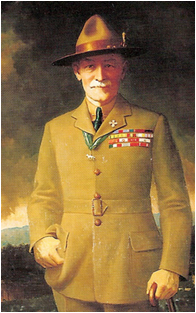Early Influences
-
Baden-Powell's Experiences:
-
Robert Baden-Powell, who later became known as BP, was inspired by his experiences during the Siege of Mafeking in the Second Boer War (1899-1902). His military work with young soldiers, known as "scouts," and his observations of their enthusiasm and skill led him to envision a broader, more structured movement for youth.
-
"Scouting for Boys":
-
In 1908, Baden-Powell published Scouting for Boys, a book that outlined the principles and practices of the Scouting movement. The book was intended as a guide for boys and leaders and was instrumental in laying the foundation for Scouting. It emphasized outdoor activities, self-reliance, and community service.
Establishment of the Movement
-
First Scout Troop (1907):
-
Before the publication of his book, Baden-Powell conducted a trial camp on Brownsea Island in England in August 1907. This camp was the first official Scout camp and served as a practical test of his ideas. The success of this camp was a key factor in the establishment of the Scouting movement.
-
Formation of The Boy Scouts Association (1908):
-
Following the success of the trial camp and the publication of Scouting for Boys, the Boy Scouts Association was officially formed in 1908 in the United Kingdom. This marked the formal beginning of the Scouting movement.
Growth and Expansion
-
International Expansion:
-
The success of the Boy Scouts in the UK led to the establishment of Scout organizations in other countries. The movement spread rapidly, with the first international Scouting event, the World Scout Jamboree, held in London in 1920. This event marked the beginning of Scouting as a global movement.
-
Founding of The Girl Guides Movement:
-
Recognizing the need for a parallel movement for girls, Baden-Powell’s sister, Agnes Baden-Powell, founded The Girl Guides Association in 1910. This organization mirrored the principles of Scouting and provided similar opportunities for girls.
Principles and Methods
-
Core Principles:
-
Duty to God: Scouting encourages a sense of spiritual development and responsibility.
-
Duty to Others: Emphasis on service to others and contributing to the community.
-
Duty to Self: Focus on personal development, self-reliance, and self-improvement.
-
Method:
-
The Scouting method includes a combination of activities such as outdoor adventures, community service, and skills development. It also incorporates a system of badges and awards to recognize achievements and encourage progress.
Organizational Structure
-
World Organization:
-
In 1920, the World Organization of the Scout Movement (WOSM) was established to coordinate and support Scouting activities globally. Today, it includes over 170 member countries and millions of Scouts.
-
National and Local Groups:
-
Each country has its own national Scouting organization, which operates under the guidelines of WOSM but adapts to local cultures and needs. Local Scout troops and packs are organized to facilitate the activities and programs at the community level.
Legacy and Impact
Scouting has had a significant impact on youth development worldwide, fostering leadership skills, outdoor appreciation, and community service. It has continued to adapt and grow, addressing contemporary issues while remaining true to its foundational principles






















